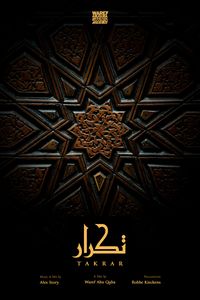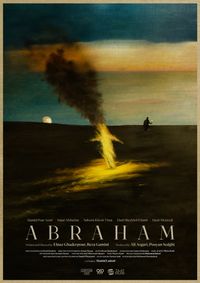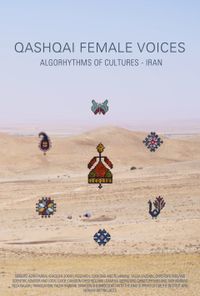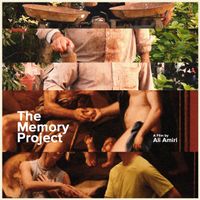NAWA 2025 Selected Visuals |Porgy & Bess exhibition room
Takrar - Waref Abu Quba
Waref Abu Quba is an award-winning Syrian-German film director and visual artist. His projects are often influenced by themes of identity, memory, and cultural heritage. In his creative work, Waref constantly pushes the boundaries and experiments with new ideas and mediums, combining cinematography, animation and innovative post-production techniques
Takrar (meaning ‘repetition’ in Arabic) is an experimental film directed by Waref Abu Quba that celebrates the intricate beauty of ancient craftsmanship, paying homage to the rich artistic traditions of Islamic, Ottoman, Greek, and Byzantine cultures. Filmed in Istanbul, the film transforms the city’s breathtaking patterns, textures, and architectural details into a mesmerizing visual and sonic experience.
The making of Takrar was an extensive creative journey. Over two years, the film was crafted from 2,900 photographs, transformed into 270 animated sequences. Each holding a surprise when started moving and came to life.
Abraham - Elnaz Ghaderpour, Reza Gamini
Elnaz Ghaderpour is born on 1990 in Kermanshah, Iran. Tehran Art University graduated in BA film directing and an MA in Editing. For 12 years she has worked as an editor. Abraham is her first short film.
Born 1988 Tehran, Iran. Reza Gamini has directed 5 short films including Endorphin which won a special mention for the jury at the 66th Locarno Film Festival.
It’s a short movie about a murdered transsexual teenage boy who was living in a religious small town in Iran. As you may know, Iran is currently governed by a radical religious regime that doesn’t acknowledge the LGBTQ+ community’s existence altogether! let alone allowing for any sort of platforms for them to be heard. We believe it’s the emerging artists’ job to be the voice of such unspoken marginalized communities and find ways to address their challenges and their basic survival needs. So, we chose to make this film about religion, fanaticism, and human diversity.
Fām II - Arash Akbari
Fām II is a visual music piece that explores the aesthetics of algorithmic processes. Generated from a single block of logic-based code, it simultaneously produces and manipulates both audio and visual streams, forming a perceptual field of pulsation and uncertainty. Through computation and recursion, the system creates an improvisational sensory phenomenon, detached from symbolic systems of conceptualization and control. The first iteration of the piece was presented at Orbit Festival in Utrecht and MAPP_MTL in Montreal.
Arash Akbari is a transdisciplinary artist from Tehran, Iran. He investigates the interplay between dynamic art systems, human perception, nonlinear narrative, and the convergence of physical and digital realms. His exploration spans the domains of generative systems, interaction design, immersive technologies, and real-time processing.
Approaching the dominant technological paradigm with a critical perspective, he seeks alternative narratives where computational processes and interactive cybernetic systems give rise to concepts, ideas, and questions, eliciting affective personal and social impacts and responses.
Akbari directs his experimental practices into audio-visual performances and installations, interactive software, sonic environments, and multisensory experiences.
Algorhythms of Cultures - Yalda Yazdani, Christoph Wieland
This short documentary revolves around the tradition of weaving carpets (ghali), as a strong symbol of nomadic cultures that connect various ethnicities in the east and west, through different countries and regions. Among these, Persian carpets are one of the most famous and valued as an icon of colorful designs, sophisticated ornaments, and highly skilled crafts. And although their production has migrated more and more towards the cities, restructured into market-oriented companies, there are still a few traditional female weavers, who are still keeping the complex knowledge and skills of carpet making.
The making of the carpets has been genuinely in the domain of women. While tying the knots singing is an essential part of creating a carpet. The women sing rhythmic songs in harmony with the movements and sounds of their hands, transforming single woolen threads to an ensemble of visual art. The ornaments and symbols in the carpets tell stories about creation myths, ancient knowledge, historical events, worshipping nature or personal stories of the women and their nomadic life.
To explore the relations between music, crafts, and iconography the researchers and filmmakers Yalda Yazdani and Christoph Wieland have documented their encounter with Khadijeh Jokar and Azar Parsai from the Qashqai tribes in their summer pastures in the south of Iran.
The Memory Project - Ali Amiri
Ali Amiri is an Iranian filmmaker and video artist based in Vienna. He holds a Master of Arts in Landscape Architecture and is currently pursuing his diploma in Fine Arts at the Film Department of the Academy of Fine Arts Vienna. Ali began his artistic career as a graphic designer and photographer in 2015 and has been professionally working with moving images since 2017, focusing on music videos and experimental films.
About his film "The Memory Project" he mentions: "In an attempt to forget and out of fear of facing my childhood, I escape by becoming others—or even objects. This pattern began in childhood and continues today, as I explore memory through film during my studies in Vienna. I’m currently working on the third Narrative of this film titled “Viennese Wind”, which explores my personal experiences within the Iranian diaspora artist community."




